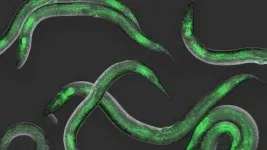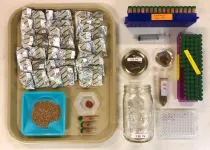(Press-News.org) A University of Texas at Arlington hydrologist’s study in the Nature journal Scientific Data provides the first-ever global estimate of human destruction of natural floodplains. The study can help guide future development in a way that can restore and conserve vital floodplain habitats that are critical to wildlife, water quality and reducing flood risk for people.
Adnan Rajib, a UT Arlington assistant professor in the Department of Civil Engineering, was the lead author on the published study, “Human Alterations of the Global Floodplains.” His doctoral student, Qianjin Zheng, played a significant role in developing the research.
U.S. Environmental Protection Agency (EPA) scientists Charles Lane, Heather Golden and Jay Christensen; Itohaosa Isibor of Texas A&M University-Kingsville; and Kris Johnson of The Nature Conservancy collaborated on the study. The work was funded through NASA and the National Science Foundation.
“The bottom line is that the world is at greater flood risk than what we realized, especially considering what effect human development has had on floodplains,” Rajib said. “In 27 years, between 1992 and 2019, the world has lost a dramatic 600,000 square kilometers of floodplains due to human disturbances, which include infrastructure development, industry and business construction and expansion of agriculture.”
The team used satellite remote sensing data and geospatial analytics in studying 520 major river basins of the world, discovering previously unknown spatial patterns and trends of human floodplain alterations.
“Mapping the world’s floodplains is relatively new. While there is increasing awareness to map floodplains accurately and understand flood risks, an attempt to map human disturbances in those floodplains at a global scale never existed,” said Rajib, who also is the director of the UT Arlington Hydrology and Hydroinformatics Innovation Lab. “It’s been done in smaller regions around the world and certainly in the United States and Europe, but not in data-poor regions of the world.”
The study concludes that wetland habitats are in danger and that one-third of the total global loss of floodplain wetlands occurred in North America. Rajib said the magnitude of risk for floodplains is much larger than what was previously understood. He and the team examined satellite pictures of those floodplain areas taken over the past 27 years.
“We wanted to look at floodplains at the neighborhood level,” Zheng said. “We wanted to see the impact of development on someone who lives adjacent to or near a floodplain. Some of the changes in these pictures are good, like when trees are planted or parks are built. But many of the pictures reveal disturbing outcomes. For instance, we saw a dramatic increase in the development of parking lots or the construction of buildings without adequate stormwater runoff allowances.”
Johnson, a co-author on the paper, said that “worldwide, floodplains are biodiversity hotspots that also provide a wide range of ecosystem services for people. We hope this study sheds light on this critical habitat we’re losing as well as ways in which we can reverse the trend.”
Melanie Sattler, chair and professor of the Department of Civil Engineering, said this study should give planners a vital tool to reduce flood risks for people.
“Rajib’s work can be our lens to help guide future development in order to decrease susceptibility to floods in a changing climate,” Sattler said. “And, in some cases, we hope this study can help us correct mistakes we’ve made through past development decisions.”
END
Study reveals human destruction of global floodplains
‘The world is at greater flood risk than what we realized,' UTA scientist says
2023-09-09
ELSE PRESS RELEASES FROM THIS DATE:
MSU research shows table salt could be the secret ingredient for better chemical recycling
2023-09-08
Images
Researchers at Michigan State University have shown that table salt outperforms other expensive catalysts being explored for the chemical recycling of polyolefin polymers, which account for 60% of plastic waste.
The research, published in the journal Advanced Sustainable Systems, shows that sodium chloride could provide a safe, inexpensive and reusable way to make plastics more recyclable.
The team also showed that table salt and other catalysts could be used in the recycling of metallized plastic films — like ...
RESEARCH ALERT: City of Hope scientists identify new therapeutic target for metastatic cancer
2023-09-08
FINDINGS
In a recent study led by Lei Jiang, Ph.D., an assistant professor of molecular and cellular endocrinology, a team of researchers from City of Hope and the University of Texas Southwestern Medical Center, found a potential new target for treating patients with metastatic cancer. Their findings were published in the August 29 issue of the journal Cell Reports.
The goal of the team’s study was to elucidate the role of reductive carboxylation in redox metabolism, a process believed to be important for metastatic cancer. Reductive carboxylation is best known as a metabolic pathway that provides a molecule called acetyl-CoA so that it can be turned into lipids, which ...
McWilliams School of Biomedical Informatics researchers awarded $3.4M NIH grant to understand link between chronic health conditions and Alzheimer's disease
2023-09-08
A three-year, $3.4 million grant to investigate how Alzheimer’s disease is connected to multiple chronic diseases has been awarded to UTHealth Houston researchers by the National Institute on Aging, part of the National Institutes of Health.
To study this, a team led by Xiaoqian Jiang, PhD, principal investigator and professor and chair in the Department of Health Data Science and Artificial Intelligence with McWilliams School of Biomedical Informatics at UTHealth Houston, will build risk trajectory maps for patients using clinical data and electronic health records. Specifically, they will develop electronic health records ...
SwiftPharma and the Population Council pursue agreement to manufacture Griffithsin needed for the development of a fast-dissolving insert for protection against HIV
2023-09-08
September 8, 2023 – SwiftPharma, a Belgium-based manufacturer, and the Population Council, a global nonprofit research organization, have signed a Manufacturing Master Service Agreement for the plant-based manufacture of Griffithsin to further the Council’s development of a Griffithsin fast-dissolving vaginal insert for protection against HIV.
The Population Council has been developing a non-antiretroviral HIV-prevention method containing Griffithsin (GRFT) in a fast-dissolving insert (FDI). This Griffithsin FDI is an on-demand, user-controlled, portable prevention technology in early development ...
What defines a safety-net hospital?
2023-09-08
Safety-net hospitals have a common mission to provide care for Medicaid beneficiaries and those who are uninsured, but there’s no universal definition for these hospitals—complicating efforts to allocate funding.
In a new analysis published in JAMA Network Open and led by researchers at the NYU School of Global Public Health, the research team looked at five established definitions for safety-net hospitals and found that different criteria captured varying hospitals and characteristics. As a result, when the Centers for Medicaid and Medicare Services (CMS) use one definition ...
Heatwaves hitting Antarctica too
2023-09-08
The world saw another year full of extreme weather events resulting from climate change in 2022, from intense storms to soaring temperatures and rising sea levels. Antarctica was no exception, according to new research published this week.
In the 33rd annual State of the Climate report, an international assessment of the global climate published Sept. 6 in the Bulletin of the American Meteorological Society, CU Boulder researchers report that the planet’s coldest and driest continent experienced both an unprecedented heatwave and extreme precipitation last year.
“My hope is that the public starts to see both the fragility and complexity of these ...
These worms have rhythm
2023-09-08
There’s a rhythm to developing life. Growing from a tiny cell cluster into an adult organism takes precise timing and control. The right genes must turn on at the right time, for the right duration, and in the correct order. Losing the rhythm can lead to diseases like cancer. So, what keeps every gene on beat?
Cold Spring Harbor Laboratory (CSHL) Professor Christopher Hammell has found that in the worm C. elegans, this genetic orchestra has no single conductor. Instead, a quartet of molecules works in concert to time each developmental stage. Hammell says this process shares some similarities with the circadian clocks that control human ...
Sleep-wake therapy gives new hope for teens with depression
2023-09-08
Sleep-Wake Therapy Gives New Hope for Teens with Depression
Promoting healthy sleep in teen night owls brings adolescents’ biology and school demands in alignment.
School systems aren’t built for kids who fall asleep and wake up late, the so-called “night owls,” which may help explain why this group of teens is more prone to depression.
Now, researchers at UC San Francisco have found a way to help these kids adjust to their natural sleep-cycle rhythms while still fulfilling their school responsibilities. The findings are a welcome sign for adolescents with ...
Study explores an underappreciated way warmer temperatures will impact ecosystems: Decomposition
2023-09-08
Our world is changing, and warming temperatures will alter our natural ecosystems. Some of these changes will be straightforward, like animal ranges creeping northward as they strive to maintain their ideal temperatures. But other changes will be more complicated, as warming sets off complex chain reactions that reverberate through these systems.
An important process in ecosystems is the decomposition of plant litter, in which dead plant material is broken down by animals, fungi, and microbes, making its nutrients accessible to the next generation of plants. How quickly this breakdown happens — the decomposition ...
UMBC team of data scientists named a tools competition winner
2023-09-08
Baltimore – A team of four data scientists from the University of Maryland, Baltimore County, was named today as one of 32 winners of the Tools Competition, one of the largest education technology (edtech) competitions in the world that awarded more than $4 million to winners this year.
The team was a winner in the DARPA AI Tools for Adult Learning opportunity, which sought artificial intelligence-powered tools to help adults learn complex topics necessary for the current and future national security workforce (e.g., AI engineering ...
LAST 30 PRESS RELEASES:
Black soldier fly larvae show promise for safe organic waste removal
People with COPD commonly misuse medications
How periodontitis-linked bacteria accelerate osteoporosis-like bone loss through the gut
Understanding how cells take up and use isolated ‘powerhouses’ to restore energy function
Ten-point plan to deliver climate education unveiled by experts
Team led by UC San Diego researchers selected for prestigious global cancer prize
Study: Reported crop yield gains from breeding may be overstated
Stem cells from human baby teeth show promise for treating cerebral palsy
Chimps’ love for crystals could help us understand our own ancestors’ fascination with these stones
Vaginal estrogen therapy not linked to cancer recurrence in survivors of endometrial cancer
How estrogen helps protect women from high blood pressure
Breaking the efficiency barrier: Researchers propose multi-stage solar system to harness the full spectrum
A new name, a new beginning: Building a green energy future together
From algorithms to atoms: How artificial intelligence is accelerating the discovery of next-generation energy materials
Loneliness linked to fear of embarrassment: teen research
New MOH–NUS Fellowship launched to strengthen everyday ethics in Singapore’s healthcare sector
Sungkyunkwan University researchers develop next-generation transparent electrode without rare metal indium
What's going on inside quantum computers?: New method simplifies process tomography
This ancient plant-eater had a twisted jaw and sideways-facing teeth
Jackdaw chicks listen to adults to learn about predators
Toxic algal bloom has taken a heavy toll on mental health
Beyond silicon: SKKU team presents Indium Selenide roadmap for ultra-low-power AI and quantum computing
Sugar comforts newborn babies during painful procedures
Pollen exposure linked to poorer exam results taken at the end of secondary school
7 hours 18 mins may be optimal sleep length for avoiding type 2 diabetes precursor
Around 6 deaths a year linked to clubbing in the UK
Children’s development set back years by Covid lockdowns, study reveals
Four decades of data give unique insight into the Sun’s inner life
Urban trees can absorb more CO₂ than cars emit during summer
Fund for Science and Technology awards $15 million to Scripps Oceanography
[Press-News.org] Study reveals human destruction of global floodplains‘The world is at greater flood risk than what we realized,' UTA scientist says





